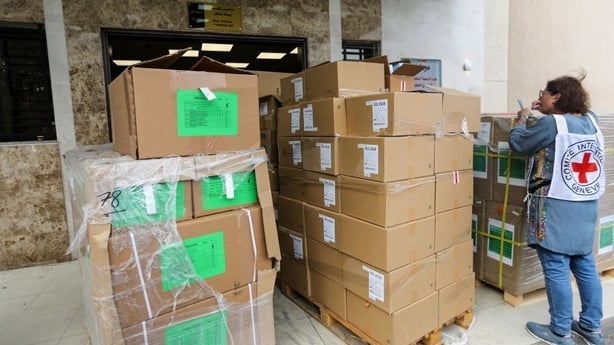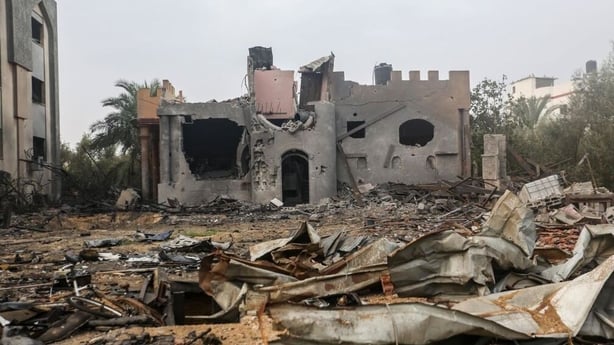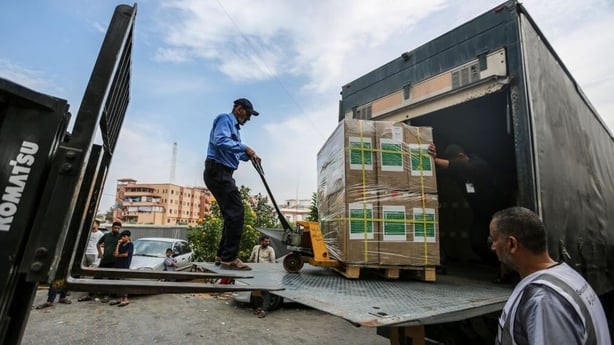The Israeli Army has continued its aerial bombardment of Gaza overnight where it claims to have struck more than 600 sites in the past 24 hours as Israeli ground operations in Gaza expand.
Last night the Israeli Defence Forces said it struck a Hamas staging spot killing 20 militants amid reports of airstrikes close to hospitals and in residential areas.
The IDF says it bombed Al-Azhar University after an anti-tank launching post was discovered.
Following its warning to evacuate the Al-Quds hospital, reports from Gaza suggest there was sustained and heavy bombing of the area around the hospital overnight.
Israel has made repeated claims that Hamas is using underground facilities near hospitals as command and control centres and hideout point, a claim Hamas denies.
Meanwhile as international pressure grows on Israel to allow more humanitarian aid into Gaza, the UN Security Council will hold an emergency session today to discuss the growing humanitarian crisis there.
Impeding aid to Gaza may be a crime - ICC prosecutor
Impeding relief supplies to Gaza's population may constitute a crime under the International Criminal Court's jurisdiction, the court's top prosecutor has told a news conference in Egypt.
Karim Khan also said Israel must make "discernable efforts, without further delay to make sure civilians receive basic foods, medicine".
Aid supplies to Gaza have been minimal since Israel began bombarding the densely populated Palestinian enclave in response to a deadly attack by its ruling militant group Hamas on 7 October.
Israeli officials have said that food, water and medicines have been coming in through the Egyptian border and that it expected the quantities to rise.
United Nations officials have said the aid supplies are limited and do not correspond to the huge need on the ground.
In an unannounced visit, the ICC prosecutor went to the Rafah border crossing between Egypt and Gaza earlier in the day and posted a video statement from his location on X social media.
#ICC Prosecutor @KarimKhanQC addresses journalists after visiting the Rafah Border Crossing between Egypt and the Gaza Strip on 29 October 2023.
— Int'l Criminal Court (@IntlCrimCourt) October 29, 2023
From Cairo, the Prosecutor gives a statement on the current situation in Israel and the State of Palestine👇https://t.co/666En6yBIT
Mr Khan said he was not able to get into Gaza but hopes to visit Gaza and Israel while he is in the region.
The court has been investigating in the occupied Palestinian territories since 2021, looking into possible war crimes and crimes against humanity there from 2014 onwards.
Israel, which is not a member of the ICC, has previously rejected the court's jurisdiction and does not formally engage with its investigations.
Mr Khan has previously said that the ICC has jurisdiction over alleged war crimes and crimes against humanity during both the 7 October Hamas attack in Israel and in the territory of Gaza.
His comments come as Israeli forces are waging ground operations against Hamas in Gaza in what Israeli Prime Minister Benjamin Netanyahu called the second phase of a three-week-old war aimed at crushing the Palestinian militant group.
However, telephone and internet communications in Gaza, largely severed late on Friday as Israel's warplanes dropped bombs and its troops pushed into the Hamas-ruled enclave, were returning slowly today, Palestinian media outlets reported.
The disruption of communications had impacted rescue operations, with people hit by the air strikes unable to call for help.
Israeli fighter jets dropped leaflets over Gaza city yesterday, warning residents that the area was now a "battlefield", that shelters in northern Gaza were not safe, and they should "evacuate immediately".
The army delivered similar warnings earlier in its campaign, but many who fled south have returned home after failing to find refuge from Israeli bombing.
The Israeli Army posted a video online overnight in which it said it is extending what it called it's "operation" in Gaza and was moving to the next phase.
It said it was increasing the urgency of its warning to people in northern Gaza and Gaza city to move south, for their own safety.
Israeli military spokesman Daniel Hagari said civilians should go south "to a safer area where they can receive water, food and medicine", vowing that "the humanitarian efforts to Gaza, led by Egypt and the United States, will be expanding".

Thousands of desperate Gaza residents broke into warehouses and distribution centres of the United Nations Palestinian refugee agency (UNRWA) grabbing flour and "basic survival items", the organisation said.
Israel will allow a dramatic increase in aid to Gaza in the coming days and Palestinian civilians should head to a "humanitarian zone" in the south of the tiny territory, said Colonel Elad Goren of Cogat, the Israeli Defence Ministry agency that coordinates with the Palestinians.
Mr Netanyahu warned Israelis to expect a "long and hard" campaign but stopped short of calling the current incursions an invasion.
Some of US President Joe Biden's aides have advised Israeli counterparts to hold off on an immediate all-out assault, US officials say.
Read more:
Analysis: Hamas persists in Gaza despite Israel's efforts to 'annihilate' them
Even as initial ground operations appeared limited for now, Mr Netanyahu pledged to spare no effort to free the more than 200 hostages, including foreigners, held by Hamas.
"This is the second stage of the war whose goals are clear -to destroy Hamas' governing and military capabilities and to bring the hostages home," Mr Netanyahu told a news conference yesterday.
"We are only at the start," he said. "We will destroy the enemy above ground and below ground."
Israeli fighter jets dropped leaflets over Gaza city yesterday, warning residents that the area was now a "battlefield", that shelters in northern Gaza were not safe, and they should "evacuate immediately".
The army delivered similar warnings earlier in its campaign, but many who fled south have returned home after failing to find refuge from Israeli bombing.

The Israeli Army posted a video online overnight in which it said it is extending what it called it's "operation" in Gaza and was moving to the next phase.
It said it was increasing the urgency of its warning to people in northern Gaza and Gaza city to move south, for their own safety.
Israeli military spokesman Daniel Hagari said civilians should go south "to a safer area where they can receive water, food and medicine", vowing that "the humanitarian efforts to Gaza, led by Egypt and the United States, will be expanding".
All night long bombs fell on Gaza, 450 military target were hit, according to the IDF.
Some reports have suggested repeated strikes using bunker bombs in some areas of eastern and northern Gaza.
Israel has tightened its blockade and bombarded Gaza for three weeks since the Islamist group Hamas' devastating 7 Octover attack.
At least 1,400 Israelis were killed in the deadliest day of the nation's 75-year history, Israeli authorities said.
Western countries have generally backed what they say is Israel's right to self-defence. But there has been a mounting international outcry over the toll from the bombing and growing calls for a "humanitarian pause" to allow aid to reach Gaza civilians and ease the humanitarian crisis.
Medical authorities in Gaza, which has a population of 2.3 million people, say 7,650 Palestinians have been killed in Israel's campaign to obliterate the Iran-backed militants.
Warnings
The Palestinian Red Crescent said today that it had received warnings from Israeli authorities to immediately evacuate al-Quds hospital in Gaza, adding that raids conducted had taken place just 50 metres from the facility.
An Israeli military spokesman declined to comment on the statement.
Palestinian officials said around 50,000 people were taking shelter in the Gaza Shifa Hospital and said they were concerned about ongoing Israeli threats to the facility.
With many buildings in Gaza reduced to rubble and shelter hard to find, residents are short of food, water, fuel and medicines.

Commenting on the looting of flour and other staples in Gaza, UNRWA said in a statement: "This is a worrying sign that civil order is starting to break down after three weeks of war and a tight siege on Gaza."
"God help anyone under the rubble," said one Gaza journalist, who spent a tnight in a building stairway as bombs fell and Israeli forces appeared to exchange fire with Palestinian fighters.
Mahmoud Basal, a civil defence spokesman in Gaza, told Al Jazeera that voices could be heard under the rubble, and he appealed to Arab rescue teams for heavy machinery to help dig out survivors.
It provided no details on the size of the deployment.
Israel's chief military spokesperson declined to say whether Israel had been behind the telecommunications blackout but said it would do what it needed to protect its forces.
Mr Netanyahu yesterday reiterated Israel's call for Palestinian civilians to evacuate the northern Gaza Strip where Israel was focusing its attack on what it was were Hamas hideouts and other installations.
But Palestinians say nowhere is safe, with bombs also smashing homes in the south of the densely populated territory.
Additional reporting: Fran McNulty in Tel Aviv
